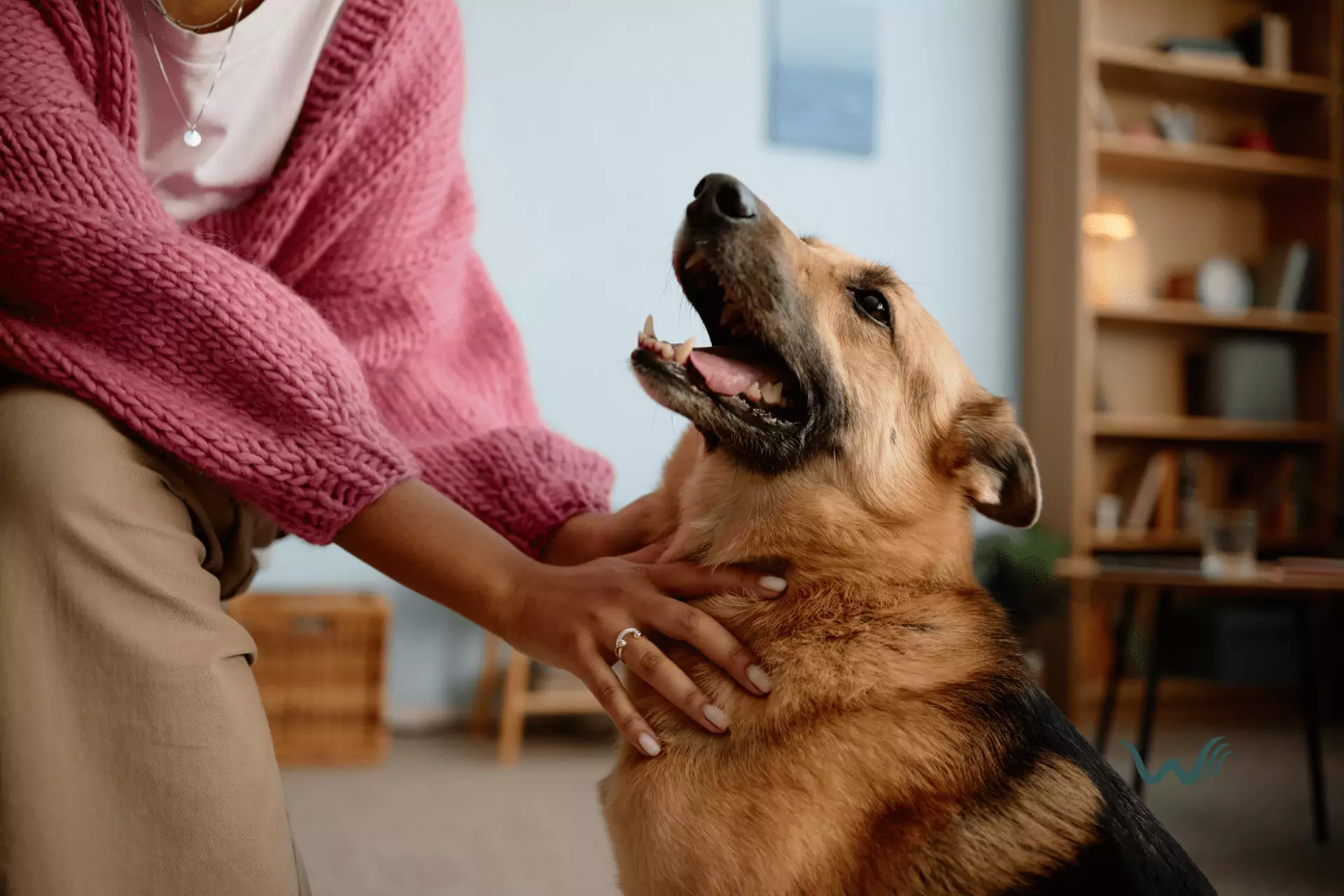

Are Poodles Hypoallergenic?
by Haley Mills
Last updated: April 21, 2024
Verified and Approved by:
Angela Morris,
MSW, LCSW
Fact Checked

When it comes to choosing a dog, many people with allergies are interested in finding a hypoallergenic breed. One of the breeds often touted as being hypoallergenic is the poodle. Poodles are known for their curly, non-shedding coats, which are said to produce less dander, the main culprit behind pet allergies.
However, the question remains: are poodles truly hypoallergenic?
To answer this question, we should understand canine allergies and the factors that contribute to them. Allergies to dogs are primarily caused by a reaction to the proteins found in their saliva, urine, and dander. Dander, in particular, is made up of tiny flakes of dead skin that can become airborne and trigger allergic reactions in sensitive individuals.
While no dog breed is completely allergen-free, some breeds are believed to produce fewer allergens and are therefore considered hypoallergenic.
Understanding Canine Allergies
If you love dogs but suffer from allergies, you may be wondering if poodles are hypoallergenic. Various factors, including pet dander, saliva, and urine can trigger canine allergies. These allergens can cause symptoms such as sneezing, itching, and difficulty breathing in sensitive individuals.
However, there is no such thing as a completely hypoallergenic dog breed. Many people believe that poodles are hypoallergenic because they have hair instead of fur. This misconception stems from the fact that poodles shed less than other breeds, which can reduce the amount of allergens in the environment. Additionally, poodles produce less dander, which is a major allergen for many people. However, it’s still possible for individuals to be allergic to poodles, as they can still produce allergens in their saliva and urine.
If you’re considering getting a poodle and have allergies, it’s recommended to undergo allergy testing for dogs. This can help determine whether you’re specifically allergic to poodles or if you have other canine allergies. Allergy testing can involve skin tests or blood tests, which can identify specific allergens that trigger your symptoms. By understanding your allergies, you can make an informed decision about whether a poodle is the right pet for you.
Exploring Poodle Breeds
Discover the different types of poodle breeds and how they can positively impact your allergies. Poodles are a versatile breed in various sizes, including standard, miniature, and toy. Regardless of size, all poodles have a similar coat that is curly and dense, which helps to minimize shedding. This is great news for individuals with allergies, as it means less dander and allergens in the environment.
Poodle grooming is an essential aspect of maintaining their hypoallergenic qualities. Regular brushing and trimming can help prevent matting and keep the coat clean and free from allergens. In addition to regular grooming, poodle health is also crucial in managing allergies. Keeping your poodle up to date on vaccinations, providing a balanced diet, and regular exercise can contribute to a healthier immune system, which in turn can help reduce allergic reactions.
Poodles are considered hypoallergenic due to their minimal shedding and curly coat. However, it’s important to note that no dog breed is completely hypoallergenic. Some individuals with severe allergies may still experience allergic reactions to poodles, albeit less frequently compared to other species.
The Myth of Hypoallergenic Dogs
Contrary to popular belief, many people mistakenly assume that certain breeds of dogs are hypoallergenic. Unfortunately, the notion of hypoallergenic dogs is largely a myth.
While it is true that some breeds may produce fewer allergenic proteins, no breed is completely hypoallergenic. The misconception of hypoallergenic dogs stems from the belief that certain breeds shed less and therefore produce fewer allergens. However, it is important to note that allergies to dogs are not caused by their fur, but rather by proteins found in their skin cells, saliva, and urine. These proteins, known as allergens, can trigger an allergic reaction in sensitive individuals.
That being said, while no breed is completely hypoallergenic, some breeds may be more suitable for individuals with allergies. For example, poodles are often touted as a hypoallergenic breed due to their curly and non-shedding coat. While poodles do produce fewer allergens than some other breeds, it is still possible for individuals with allergies to have a reaction. Therefore, it is crucial for potential dog owners with allergies to spend time with the breed they are considering and consult with their doctor before deciding.
Additionally, alternative hypoallergenic breeds, such as the Bichon Frise, Maltese, and Portuguese Water Dog, may be better suited for individuals with allergies. These breeds also have curly or non-shedding coats, which can help reduce the amount of allergens in the environment.
Managing Allergies with Poodles
When it comes to managing your allergies, poodles can be a great option for you. These intelligent and affectionate dogs have a reputation for being hypoallergenic, meaning they’re less likely to cause an allergic reaction in people who are sensitive to pet dander.
No dog breed is completely hypoallergenic, as all dogs produce allergens to some degree. Nevertheless, poodles have hair instead of fur, reducing the dander they release into the air. This can make them a better choice for individuals with allergies.
To further minimize the risk of allergies, specific grooming techniques can be employed for poodles. Regular brushing is essential to remove loose hair and dander from their coats, reducing the amount of allergens in the environment. Additionally, frequent bathing can help to keep their skin clean and free of allergens. Use hypoallergenic shampoos and conditioners specifically formulated for dogs with allergies. Trimming the hair around their eyes, ears, and paws can also prevent allergens from accumulating in these areas.
There are also allergy-friendly poodle accessories that can be used to manage allergies. One such accessory is a high-quality air purifier, which can help remove allergens from your home’s air. Another option is using allergy-friendly bedding for your poodle, such as hypoallergenic dog beds and blankets. These products are designed to repel allergens and can provide a cleaner and more allergy-friendly sleeping environment.
Are Poodles Recommended for Allergy Sufferers?
Poodles are one of the benefits of hypoallergenic dogs for allergy sufferers. Their minimal shedding and low dander production make them a suitable choice for those with allergies. While no dog breed is completely hypoallergenic, poodles can be a good option for people with allergies to pet dander.
Tips for Living with a Poodle Allergy
When managing your allergies, finding a hypoallergenic poodle breed is one of the most important things. While no dog is completely hypoallergenic, certain poodle breeds are known to produce fewer allergens than others. Look for breeds like the Toy Poodle, Miniature Poodle, or Standard Poodle, as they tend to have less dander and saliva, which are common triggers for allergies.
It’s crucial to maintain proper grooming techniques to minimize allergen exposure. Regular brushing and bathing can help remove loose hair and dander, reducing the amount of allergens in your home. Consider using allergy-friendly grooming products designed explicitly for poodles to minimize further the risk of triggering your allergies.
In addition to choosing the right breed and practicing proper grooming, there are other steps you can take to reduce allergens in your home. Keep your living space clean and well-ventilated, as this can help prevent the accumulation of allergens. Invest in a good quality air purifier with a HEPA filter to trap and remove airborne allergens.
It’s also a good idea to designate certain areas of your home as off-limits to your poodle, such as your bedroom, to create a safe space where you can retreat to if your allergies act up. Finally, it’s important to regularly wash your hands after petting or playing with your poodle to remove any allergens that may have come into contact with your skin.
Frequently Asked Questions
What are some common symptoms of canine allergies?
Common symptoms of canine allergies include itching, redness, sneezing, coughing, and skin irritations. Common treatments may include antihistamines, corticosteroids, or immunotherapy. Prevention methods can include regular grooming, a hypoallergenic diet, and minimizing exposure to allergens.
Are there any specific poodle breeds that are more hypoallergenic than others?
There are no specific poodle breeds that are more hypoallergenic than others. However, some breeders, such as the Labradoodle or Goldendoodle, have attempted to create crossbreeds with poodles to enhance their hypoallergenic traits.
Can poodles completely eliminate allergic reactions in allergy sufferers?
The role of grooming in managing allergies is crucial for poodle owners. While poodles are often regarded as hypoallergenic, no dog breed can completely eliminate allergic reactions in allergy sufferers due to the presence of dander.
Are there any alternative methods to managing allergies besides having a poodle?
Alternative allergy management methods include reducing exposure to allergens, using air purifiers, and taking allergy medications. Nonpoodle hypoallergenic dog breeds such as Bichon Frise, Maltese, and Schnauzers can also be considered for allergy sufferers.
How can I prevent allergens from spreading throughout my home if I have a poodle?
To prevent allergens from spreading throughout your home when you have a poodle, there are several tips you can follow. Regular grooming is crucial for reducing allergens, such as dander. Additionally, keeping a clean and dust-free environment can help minimize allergen exposure.
Certify Your Emotional Support Animal Today

Why You Can Rely on Us?
At Wellness Wag, we believe your pet deserves care rooted in both science and compassion. Each article is carefully researched, written in clear language for pet owners, and then reviewed by qualified professionals to ensure the information is evidence-based, current, and practical for real-life care. Our goal is to help you feel confident in making informed decisions about your pet’s health and well-being.
Reviewed by
Angela Morris, MSW, LCSW
Angela is a licensed clinical social worker with 20 years of experience in patient advocacy and community mental health. She has assisted numerous clients with ESA evaluations and brings a deep understanding of disability accommodations, ensuring that all information is accurate, supportive, and practical.

Written by :
Haley Mills
Last Updated :
April 21, 2024












